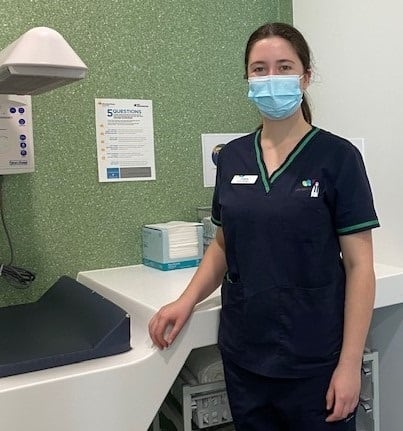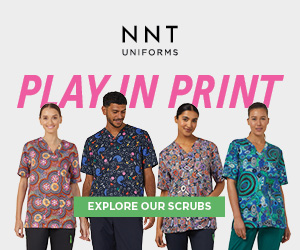What is a RUSOM, you ask? Well, RUSOM stands for a Registered Undergraduate Student of Midwifery and is a new employment role at Western Health, Melbourne; the first health service in Victoria to trial this new role.
Fourteen RUSOMs from three different universities, currently completing either a four-year dual nursing and midwifery degree or a three-year midwifery only degree, have been employed to provide care in the postnatal wards.
The RUSOMs are in their final year of study and are provided leave and flexible rostering to attend their university commitments.
A RUSOM supports the work of registered midwives by providing basic care to women and their newborns and conducting associated tasks.

Each RUSOM is supervised by a registered midwife responsible and accountable for the tasks delegated to them.1 The RUSOM role has clear guidelines for activities. These include providing direct care such as assisting hygiene including baby baths, providing nutrition assistance including breastfeeding support, mobility assistance, safe environment maintenance and restocking, answering call bells, some basic documentation and offering general support and education to women and their families.
Evidence from pilots in Victorian hospital settings suggested that Registered Undergraduate Students of Nursing (RUSON) were well received by staff and patients, and the implementation of their roles was associated with reduced overtime and agency costs.2
Furthermore, they worked effectively within their scope of practice, promoted satisfaction of their nursing colleagues, improved the quality of patient care, and their presence on wards were associated with reduced incidences of patient falls.3
The benefits of the role for the RUSON themselves have also been outlined,4 finding that having such a role allowed them to feel part of the hospital team, have direct involvement in patient care, and make a real impact with their work. They also reported a greater sense of autonomy, opportunities to develop critical thinking skills, and enhanced confidence and mastery in basic nursing skills. We anticipate similar outcomes from the RUSOM trial. The RUSOM role may also benefit the student as they promote the development of clinical skills by immersion in the clinical environment and direct exposure to the workforce builds skills for work readiness upon graduation.5 The RUSOM role can also provide a means for financial support while studying1.
The RUSOM health assistant role was developed to support the healthcare system and alleviate midwifery workforce shortages.6 Our objectives were to:
- increase quality of care to women and babies;
- improve the working lives of our midwives;
- increase midwife satisfaction;
- staff our wards to proactively meet changing demands, and attract the best midwifery students to Western Health; and
- complement the students’ undergraduate experience and ideally retain them as graduates.
An extensive mixed-methods evaluation is currently underway with positive preliminary results. For example, all the RUSOMs that responded to a recent survey (n=12) said they found the role stimulating, enjoyable, and felt respected as a valuable team member. One RUSOM commented, “I just love the RUSOM role. It is actually a midwifery student’s dream come true”. Midwives that responded to a recent survey (n=74) were overwhelmingly positive about the RUSOM role, and 95% said they had increased satisfaction with their work because of the RUSOM introduction, and 97% felt RUSOMs be valued members of the team. One midwife explained, “RUSOM are a great support to our midwives and the team. Their help is so valuable to our women, midwives, and for their own development.”
The RUSOM role is a valuable adjunct in the provision of midwifery care and education at Western Health. With forecasted midwifery workforce shortages and increased maternity service demands, is it time to ‘bring in the RUSOM?’
References
-
Australian Nursing and Midwifery Federation. RUSON employment model, www.anmfvic.asn.au/ruson (2020, accessed 14 May 2020).
-
Department of Health. Evaluation of three Better Skills Best Care pilot projects. 2011. Victoria: Department of Health Victoria.
-
Department of Health and Human Services. Health Assistants in Nursing. 2015. Victoria: Department of Health and Human Services.
-
Algoso M and Peters K. The experiences of undergraduate Assistants in Nursing (AIN). Nurse Education Today 2012; 32: 197-202.
-
Hasson F, McKenna HP and Keeney S. A qualitative study exploring the impact of student nurses working part-time as a health care assistant. Nurse Education Today 2013; 33: 873-879. Research Support, Non-U.S. Gov’t.
-
Department of Health and Human Services. Registered undergraduate student of nursing (RUSON): Employment and implementation guide. 2020. Victoria: Health and Human Services.
Authors:
Linda Sweet RN, RM, BNg, MNgSt (Mid), GradCertED, PhD, FACM is Chair in Midwifery in the School of Nursing and Midwifery at Deakin University, Victoria, Australia and Centre for Quality and Patient Safety Research at Western Health Partnership, Victoria Australia
Vidanka Vasilevski BSc & Psych(Hons), PhD, is Research Fellow in the School of Nursing and Midwifery at Deakin University, Victoria, Australia and Centre for Quality and Patient Safety Research at Western Health Partnership, Victoria Australia
Susan Sweeney PGDipMid, PGDipMgt&HCLead, AdvDipCommSectMgt, MN, MBA is Director of Midwifery Practice at Western Health, Victoria Australia
Wendy Watson RN, BHealthSc (Hons) is Divisional Director Women’s and Children’s Services at Western Health, Victoria Australia
Shane Crowe BN, BEd, ProfCertHlthSysMgt, MACN is Executive Director of Nursing and Midwifery at Western Health, Victoria Australia








